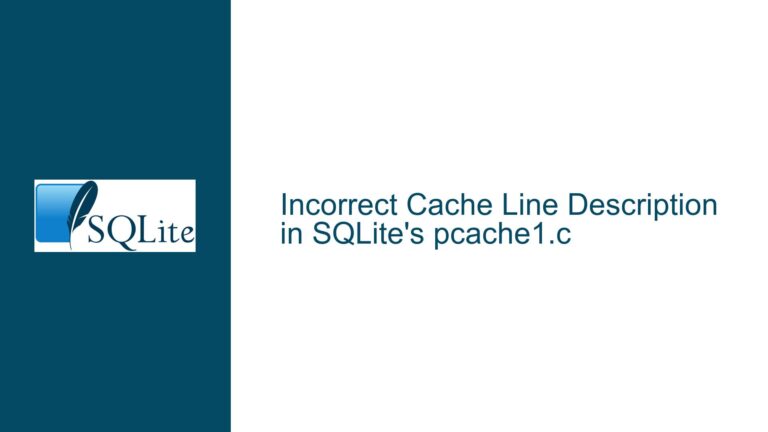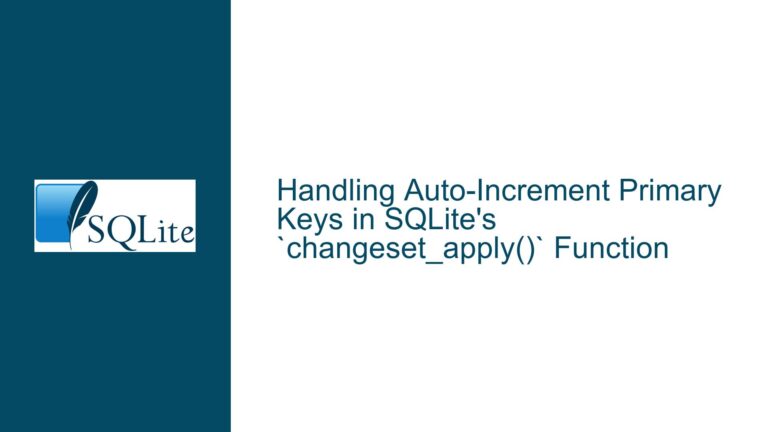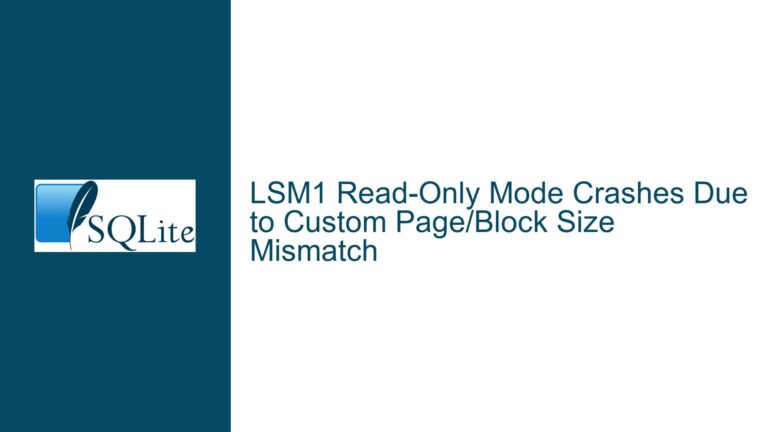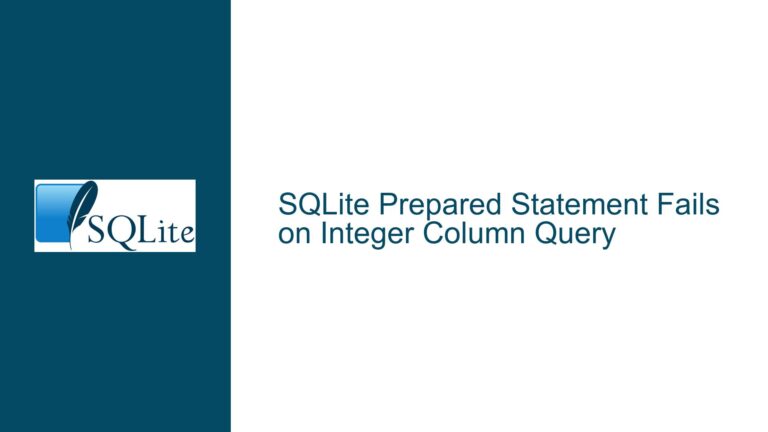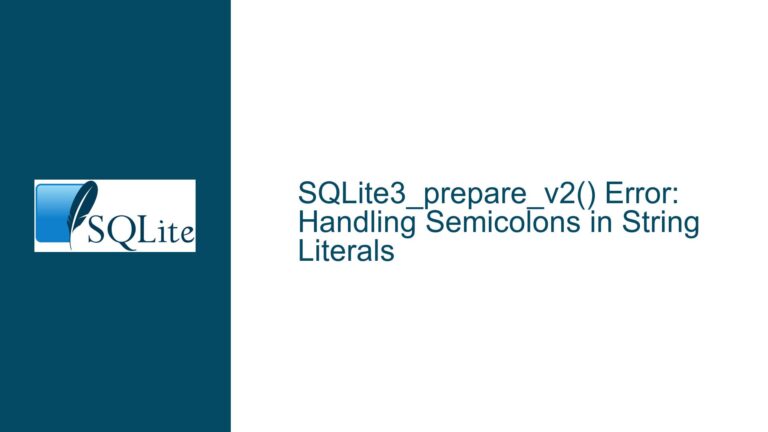Compiling SQLite3 with GNU Readline Support on macOS and BSD Systems
Issue Overview: Compiling SQLite3 with GNU Readline Support
Compiling SQLite3 with GNU Readline support on macOS and BSD systems can be a challenging task due to the intricate interplay between the SQLite3 build system, the GNU Readline library, and the system-specific configurations. The primary issue revolves around the configure script’s inability to correctly detect and link the GNU Readline library, even when the library is installed and accessible. This problem is exacerbated by the presence of system-provided libraries like libedit, which can interfere with the build process.
The core of the issue lies in the configure script’s logic for detecting and linking libraries. The script often fails to include the necessary -lreadline flag during the library detection phase, leading to a failed build or a build that incorrectly links against libedit instead of GNU Readline. This misconfiguration can result in a SQLite3 binary that either lacks readline support or exhibits unexpected behavior, such as broken command history.
Additionally, the problem is compounded by the fact that macOS and BSD systems often have symlinks or aliases that point libreadline to libedit, further confusing the build process. This can lead to situations where the build appears to succeed, but the resulting binary does not function as expected.
Possible Causes: Misconfigured Library Paths and Incorrect Detection Logic
The root causes of the issue can be traced back to several factors, including misconfigured library paths, incorrect detection logic in the configure script, and system-specific quirks related to library management.
One of the primary causes is the configure script’s failure to correctly set the LDFLAGS and CPPFLAGS environment variables, which are crucial for specifying the paths to the GNU Readline library and its headers. Without these flags, the script may default to searching in system directories like /usr/lib and /usr/include, where it might find libedit instead of GNU Readline.
Another contributing factor is the presence of symlinks or aliases that point libreadline to libedit. On macOS, for example, /usr/lib/libreadline.dylib is often a symlink to libedit.3.dylib. This can cause the configure script to mistakenly detect libedit as GNU Readline, leading to a build that either fails or produces a binary with incorrect behavior.
The configure script’s detection logic for GNU Readline is also a potential source of issues. The script may not include the necessary -lreadline flag when testing for the presence of the library, causing the test to fail even when GNU Readline is installed. This can result in the script incorrectly concluding that GNU Readline is not available, even when it is.
Finally, system-specific quirks related to library management can further complicate the issue. On BSD systems, for example, the configure script may incorrectly assume that the editline library is available, leading to a build that links against libedit instead of GNU Readline. This can result in a SQLite3 binary that lacks the expected readline functionality.
Troubleshooting Steps, Solutions & Fixes: Ensuring Correct Library Detection and Linking
To resolve the issue of compiling SQLite3 with GNU Readline support on macOS and BSD systems, a series of troubleshooting steps and fixes can be employed. These steps involve ensuring that the configure script correctly detects and links against GNU Readline, as well as addressing system-specific quirks related to library management.
The first step is to ensure that the necessary environment variables are set correctly. Specifically, the LDFLAGS and CPPFLAGS variables should be set to include the paths to the GNU Readline library and its headers. For example, on macOS, the following commands can be used:
export LDFLAGS="-L/opt/local/lib -lreadline"
export CPPFLAGS="-I/opt/local/include"
These commands ensure that the configure script searches for the GNU Readline library in the correct directories. After setting these variables, the configure script can be run with the appropriate options:
./configure --enable-readline --disable-editline
If the configure script still fails to detect GNU Readline, the next step is to manually inspect the config.log file to identify any errors or misconfigurations. This file contains detailed information about the tests performed by the configure script, including any errors encountered during the library detection phase.
If the config.log file indicates that the -lreadline flag is not being included during the library detection phase, a workaround is to manually edit the configure script to include the necessary flags. This can be done by modifying the sys_lib_search_path_spec and sys_lib_dlsearch_path_spec variables to include the paths to the GNU Readline library. For example:
sys_lib_search_path_spec="$sys_lib_search_path_spec /opt/local/lib"
sys_lib_dlsearch_path_spec='/opt/local/lib /lib /usr/lib'
Additionally, the configure script can be modified to search for the GNU Readline headers in the correct directories. This can be done by editing the for loop that searches for the readline.h header file:
for dir in /usr /opt/local /opt/local/readline /usr/contrib /mingw; do
for subdir in include include/readline; do
as_ac_File=`$as_echo "ac_cv_file_$dir/$subdir/readline.h" | $as_tr_sh`
{ $as_echo "$as_me:${as_lineno-$LINENO}: checking for $dir/$subdir/readline.h" >&5
$as_echo_n "checking for $dir/$subdir/readline.h... " >&6; }
if eval \${$as_ac_File+:} false; then :
After making these modifications, the configure script should be re-run, and the build process should proceed without errors.
If the build still fails or produces a binary with incorrect behavior, the next step is to ensure that the system-provided libedit library is not interfering with the build process. This can be done by temporarily renaming or removing the libedit library and its symlinks. For example, on macOS, the following command can be used:
sudo mv /usr/lib/libreadline.dylib /usr/lib/libreadline.dylib.bak
This ensures that the configure script does not mistakenly detect libedit as GNU Readline. After the build is complete, the libedit library can be restored to its original location.
Finally, if all else fails, a workaround is to use the rlwrap utility to provide readline functionality to the SQLite3 shell. This can be done by installing the rlwrap package and adding an alias to the shell configuration file. For example:
alias sqlite3="rlwrap -c sqlite3"
This workaround provides a quick and easy way to add readline functionality to the SQLite3 shell without the need to recompile the binary.
In conclusion, compiling SQLite3 with GNU Readline support on macOS and BSD systems requires careful attention to the configure script’s library detection logic and the system’s library management quirks. By following the troubleshooting steps and fixes outlined above, it is possible to successfully build a SQLite3 binary with the desired readline functionality.

